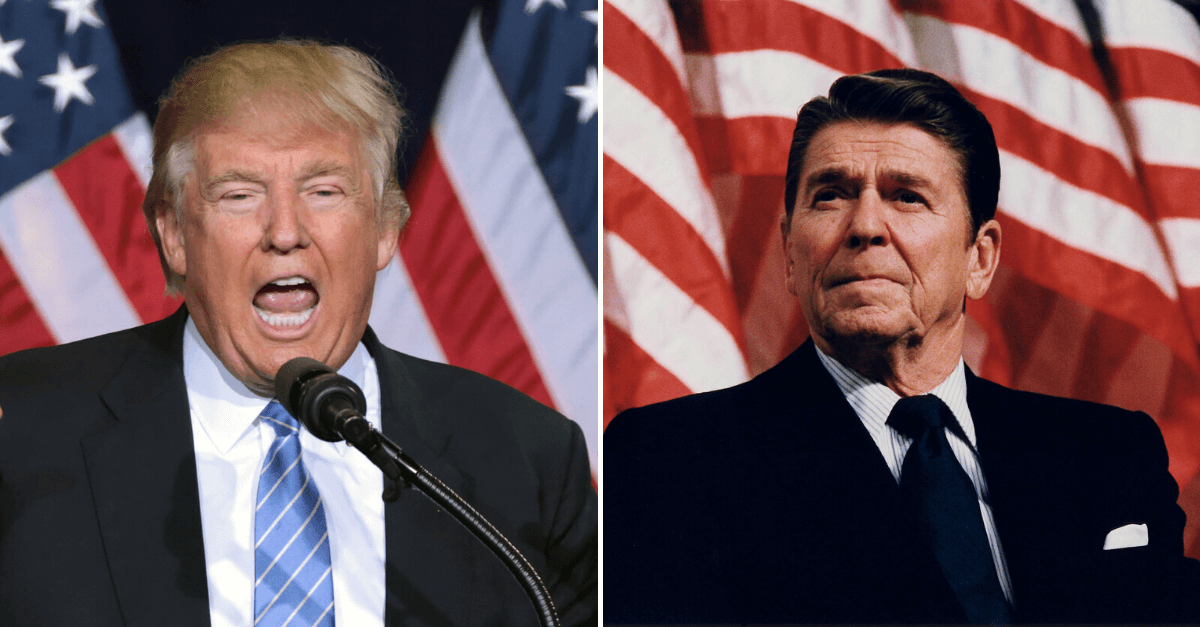
Trump photo by Gage Skidmore
Guest op-ed from Randall A. Renstrom, a political and social psychologist, and associate professor at Central College in Pella
If Donald Trump is the Republican Party’s Jimmy Carter, as many political scientists and commentators have suggested, then now is the time for Democrats to seriously think about who can be their party’s Ronald Reagan.
In other words, this nomination process should be about more than just “electability” and finding a “safe” Democratic nominee who can simply beat Trump. It should be about realigning the country around a bold new progressive political order for the future.
Reagan did more than simply defeat Carter. He ushered in a transformational Republican Revolution that defined and dominated the political landscape for four decades.
[inline-ad id=”2″]
To understand why the 2020 election should be about much more than just defeating Trump, you need to understand the theory of political time.
Developed by Yale political scientist Stephen Skowronek, the theory of political time posits that revolutionary political regimes in the U.S. rise and fall in recurring patterns. Each cycle begins with the election of a “reconstructive” president who establishes a new, paradigm-shifting political order that guides his tenure and dictates the politics of subsequent presidencies. Over time, this transformational political order eventually declines, fractures, and ends with a failed “disjunctive” president, upon which the regime is replaced with a brand new transformational political order and the pattern repeats.
[inline-ad id=”3″]
Franklin Roosevelt is a classic reconstructive president. In stark contrast to the politics that came before him, FDR ushered in a revolutionary vision of an active, interventionist government that not only defined his four terms in office but dictated the politics of subsequent presidencies of both parties. This is why Republicans like Dwight Eisenhower, who had top tax rates above 90%, and Richard Nixon, who helped establish the Environmental Protection Agency, seem so much more left-oriented compared to today’s conservatives. Both were duly-elected Republican presidents, but they still lived and operated in FDR’s world.
By the 1970s, the political order of FDR was in decline and the Democratic Party splintered, resulting in Carter’s election. Carter’s failed disjunctive presidency gave rise to the next reconstructive president, Ronald Reagan, who transformed politics and established the dominant political order we live with today, one centered on low taxes, limited regulation, and the notion that government is often the problem, not the solution. Both Bush presidencies tried to extend and articulate Reagan’s vision, while Bill Clinton and Barack Obama strained to govern progressively within its confines.
[inline-ad id=”5″]
As political scientist Julia Azari notes, Trump fits the pattern of a disjunctive president like Jimmy Carter and Herbert Hoover and his presidency likely signals the end of the Reagan era of politics.
The Republican Party is fractured and the Reagan-esque prescription of tax cuts and government restraint can no longer adequately address the problems of today — rampant inequality, stagnating wages, rural decline, global climate change, and a dysfunctional health care system. Just as Carter straddled the time period between the outgoing New Deal coalition and the incoming Reagan Revolution, Trump sits on the boundary between Reaganism and some bold new reconstructivist vision for American politics.
[inline-ad id=”0″]
But what kind of reconstructivist vision, if any, is up to Democrats and starts with next month’s Iowa caucus. This is Democrats’ chance to break free of the constraints of the Reagan era and fundamentally re-imagine, re-frame, and re-define our nation’s politics in a progressive direction that extends well beyond 2020.
Because the old ways of doing things no longer effectively addresses the current political landscape, incoming reconstructivist presidents often have the freedom to reject old ideas and build new coalitions, tear down political institutions and remake them in their image, and reset the terms of political debate for the future.
It is understandable why Democratic caucus-goers would be laser-focused on merely ousting Trump in the upcoming election and returning to “normal” politics. Whether it’s agricultural tariffs, the deportation of DACA recipients, rising white nationalism, or family separations at the border, Trump is causing very real pain for many individuals in this country.
[inline-ad id=”4″]
But to make the 2020 election solely about Trump is to squander this moment in political time.
Democrats in Iowa and across the nation have the rare opportunity to fundamentally reset the political game-board in ways not possible in recent elections. The sun is finally setting on Reagan’s “morning in America” that began way back in 1980.
Democrats should focus on who can bring about the dawn of a new progressive day. That means not merely selecting a “safe” Democratic nominee for November but finding a candidate who can boldly articulate a transformational political vision for the country that not only defeats Trump but sets the political agenda for decades beyond 2020.
[inline-ad id=”1″]
By Randall A. Renstrom, a political and social psychologist, and associate professor at Central College in Pella
Posted 1/22/20
Politics

Abortion supporters rally before Iowa Supreme Court arguments
Abortion saved her life seven years ago and Leah Vanden Bosch is more grateful for it now than ever. Vanden Bosch, who serves as the development and...

New VA program to help more than 40,000 veterans stay in their homes
The Department of Veterans Affairs (VA) will launch a “last resort” program for tens of thousands of American veterans who are in danger of losing...
Local News

No more Kum & Go? New owner Maverik of Utah retiring famous brand
Will Kum & Go have come and gone by next year? One new report claims that's the plan by the store's new owners. The Iowa-based convenience store...

Here’s a recap of the biggest headlines Iowa celebs made In 2023
For these famous Iowans, 2023 was a year of controversy, career highlights, and full-circle moments. Here’s how 2023 went for the following Iowans:...




